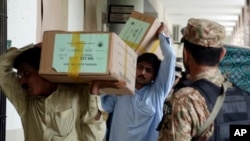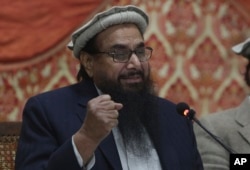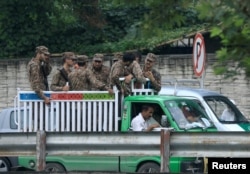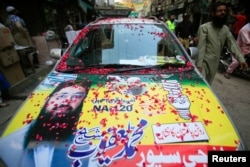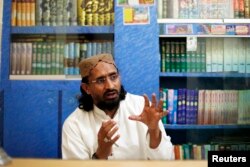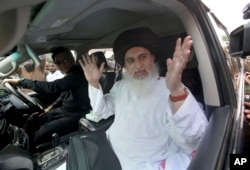Voters across Pakistan will go to the polls Wednesday to elect a new civilian government. The country's election commission disqualified many candidates on various grounds, including allegations of corruption.
Some observers charge that justice is implemented selectively against candidates who are deemed a threat to the military, while hundreds of other candidates with alleged ties to banned militant groups are allowed to run for seats.
"Although the Election Commission of Pakistan (ECP), the federal entity responsible to organize and conduct elections, clearly states no terror-linked group or individual would be allowed to contest elections, ECP made no effort to stop such elements from arranging political gatherings or to run election campaigns," Rasul Baksh Raees, a Lahore-based analyst, told VOA.
"Look at Hafiz Saeed and Khadim Rizvi of Tehreek-e-Labbaik, and several other individuals competing for national and provincial seats from all over the country," he added.
More than 110 political parties and hundreds of independent candidates will run for more than 570 provincial assembly and 340 national assembly seats. Among those running for office are candidates who are either members of banned terror groups or support religious extremism.
Election commission officials say it is not their responsibility to declare an individual or a party as a terrorist.
"This responsibility lies with the government. Our job is to make sure the legal procedures and requirements are fulfilled, and only after the vetting do we allow any individual or party to participate in the elections," Altaf Ahmad, ECP spokesperson, told VOA.
Last week, the Human Rights Commission of Pakistan (HRCP) also issued a statement, expressing concerns about election legitimacy amid dozens of extremists and banned outfits participating in the elections.
Military involvement
Hussain Haqqani, Pakistan's former ambassador to the United States and director for South and Central Asia at the Washington-based Hudson Institute, believes Pakistan's military is meddling in elections with a clear agenda.
"The establishment wants to root out the two parties that have dominated the political scene for the last three decades — the Pakistan Muslim League-Nawaz (PML-N), and the Pakistan Peoples Party (PPP)," Haqqani wrote in an opinion piece Monday for Foreign Policy magazine.
"Several religious extremists, including some who have been designated as terrorists, have been allowed to run and campaign for office freely," Haqqani added.
The military denies the accusations that it is meddling in the country's electoral process.
"We do not have any link with the elections. We are only working on the election commission's directives to improve the law-and-order situation. We do not have a direct role in polls," Maj Gen. Asif Ghafoor, spokesperson for Pakistan's Army, told the country's lawmakers last week.
The military is deploying about 350,000 soldiers across the country to various polling stations.
Militant groups
Several militant organizations are running for seats in Wednesday's elections. The Milli Muslim League (MML), a U.S.-designated terror group, is fielding more than 260 candidates to participate in the state and provincial elections under the platform of Allah-O-Akbar Tehreek (AAT), an old Islamist political party.
The U.S. State Department declared MML a terrorist group earlier this year and labeled its leadership as terrorists.
Hafiz Saeed, a U.S.-designated global terrorist accused of being the mastermind of the 2008 Mumbai terror attacks that killed 160 people, including six Americans, openly addressed political gatherings and rallies arranged on MML's behalf.
Another militant group, Ahl-e-Sunnat Wal Jamaat (ASWJ), has more than 150 candidates who are contesting for seats in the national and provincial assemblies under the platform of Rah-e-Haq Party or as independent candidates.
Aurangzeb Farooqi
Aurangzeb Farooqi of ASWJ has managed to run a strong election campaign for a seat in the national assembly from Pakistan's largest city, Karachi.
This is not the first time Farooqi has competed in elections. He ran for office in 2013 and lost by a margin of 202 votes.
"There is a chance Aurangzeb Farooqi will be able to win this time. The guy has remained on Pakistan's terror watchlist. His party, ASWJ, has a proven record of inciting hatred and sectarian violence. But he has still managed to run an election campaign, and that is an irony," Lahore-based analyst Raees said.
ASWJ is a sectarian Sunni militant group established in Punjab province in 1985 to counter Shi'ite Islam in the country. It was previously known as Sipah-e-Sahaba Pakistan (SSP). The party was placed on the country's terror watchlist for its alleged links to militant groups such as Lashkar-e-Jhangvi (LeJ) and al-Qaida.
Shafiq Mengal
Shafiq Mengal, a controversial candidate running for office, allegedly has ties to terror groups. He is running for a national assembly seat from Khuzdar, Blaochistan.
Mengal is the founder of Baloch Musalla Diffa Tanzeem, which was placed on a terror watchlist by Pakistan in 2010.
Mengal is believed to have participated in sectarian violence against the Hazara Shi'ites and Baloch insurgents running separatist movements in Pakistan's Balochistan province.
Khadim Rizvi
Pakistan Tehreek-e-Labbaik (TLP), an Islamist political party that advocates for the strict enforcement of the country's controversial blasphemy law, has also fielded more than 180 candidates for the elections.
The party's leader, Khadim Rizvi, openly admires Mumtaz Qadri and vows to follow in his footsteps.
Qadri was a bodyguard for Punjab's Governor Salman Taseer, whom Qadri assassinated in 2011 after Taseer demanded changes to the country's controversial blasphemy law.




